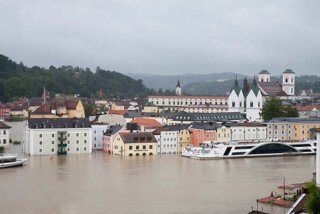Hochwasser in Passau
Henry Day
You can hardly turn a corner in Passau without stepping into a church. The town has dozens of them, large and small, old and new, some of them empty, most of them full. This is, after all, deepest Bavaria, the heartland of German Catholicism. The last pope was born a few miles up river in the village of Marktl am Inn.
St Michaelskirche was built in high Baroque style, like much of the rest of Passau’s Altstadt, after a devastating fire in the late 17th century. Its boxy, twin-towered façade is easily recognisable on the skyline. To English eyes, the stuccoed and gilded nave may come as a bit of a shock, its flamboyance belied by a rose and white exterior that blends quietly with the pastel shades of the surrounding buildings.
Once the property of the Jesuits, St Michaelskirche is now the school church for Passau’s Gymnasium Leopoldinum, where my wife was a pupil. We were married there last June. Had we decided to say ‘Ich will’ this year, we'd have found ourselves swimming down the aisle. The floods currently sweeping through Central Europe have pushed Passau under water.
In the south-east corner of Germany at the confluence of the Danube, the Inn and the Ilz, the town is no stranger to burst riverbanks. Etched on the Rathaus is a wasserstand, a chart showing how high previous floods have reached, like a neater version of a child’s growth chart scrawled on the kitchen wall. There are high water marks for 1920, 1893, 1899, 1862, 1787, 1954, 1595,1501. I’d never quite been able to believe any of these monster inundations really happened. The marker for 1501, the highest of the lot, is higher than the Rathaus’s entrance arch, which is the height of two averagely tall men. All the markers have now been submerged as the flood waters have risen almost 42 feet, and the square outside the Rathaus is one with the Danube.
Unlike in Austria and the Czech Republic, the flooding in Passau has caused no deaths. Emergency services have been navigating the town’s streets in motorboats, offering help to those trapped on upper floors. The Ilzbruecke has been swamped, cutting my in-laws off from the town centre. Drinking water is available only in bottles. There’s no electricity. Schools, shops and offices have been unable to open. Angela Merkel put in an appearance on Tuesday and promised 100 million euros of immediate state and federal aid. Whether this will help to secure election victory in September, like Schroeder’s response to Germany’s last serious flooding in 2002, remains to be seen.

Comments
With all those churches - prayer.
But perhaps God isn't German, and it's all been wishful thinking on a grand scale.
Then again, the resurrected Luther might raise an arm, but perhaps he doesn't intervene in Bavaria.